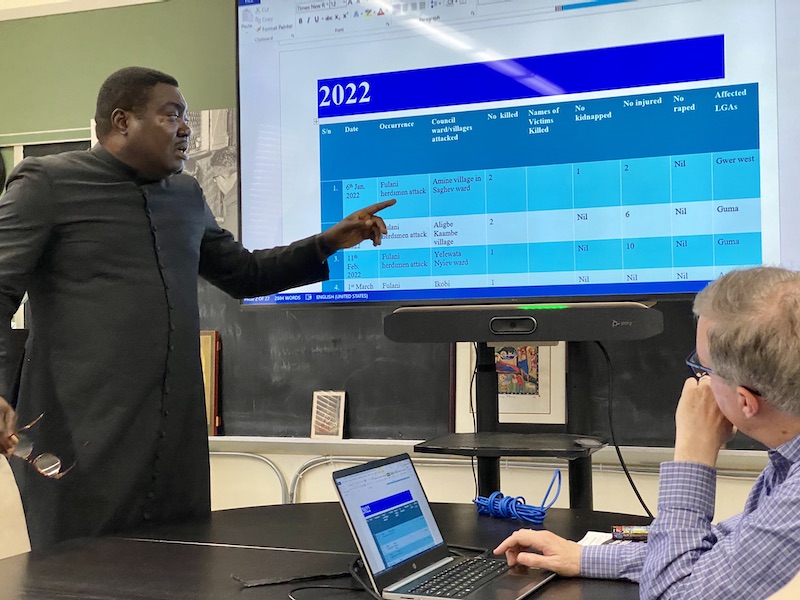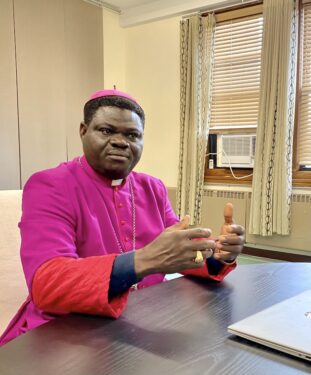
GREENPOINT — This past Holy Saturday, a day when people throughout the world happily anticipated Easter Sunday traditions, Christians in Benue State, Nigeria, fell to gunfire and machetes.
The victims were sheltered in a primary school. Some were slain where they lay for the night — the proof being human blood splashed on the walls above sleeping mats.
On Friday, June 9, Bishop Wilfred Anagbe of the Diocese of Makurdi in Benue State, shared photos of the massacre two months earlier.
Bishop Anagbe, during a stop in Brooklyn, said the attackers, Fulani herdsmen, are continuing the violence that accelerated during the two terms of President Muhammadu Buhari.
“It has gone on for too long,” he railed. “In the more than eight years of Buhari’s leadership, Nigeria has lost about 63,000 people without provocation.”
Bishop Anagbe was joined by Father Remigius Ihyula, who leads the Foundation for Justice, Development and Peace — an arm of the Makurdi Diocese.

Their U.S. visit coincided with the June 7 murder of another priest, this time in southern Nigeria near Benin City.
Bishop Anagbe and Father Ihyula visited the Brooklyn offices at the invitation of Aid to the Church in Need, U.S., in Greenpoint.
Days earlier they met with members of the U.S. Congress in Washington to raise awareness about ongoing religious persecution of Christians — most of them Catholic — in Nigeria.
Bishop Anagbe said the representatives in D.C. seemed dismayed by the Holy Saturday massacre photos.
One image showed a classroom converted into a makeshift morgue.
People of all genders and ages were stacked on top of each other — many with gaping gunshot wounds, others with deep machete gashes to their limbs. Some victims had both.
Bishop Anagbe and Father Ihyula also came to refute narratives of their federal government about the conflict between Muslim herdsmen who speak Fulani, and Christian farmers.
One narrative has been that the herdsmen and farmers are from rival tribes battling over fertile agricultural lands in Nigeria’s Middle Belt region.
Another narrative claims the dispute is a consequence of climate change, which forces the herdsmen to push their cattle from the arid north to more verdant areas in the south.
But Bishop Anagbe and Father Ihyula assert that the dispute is perpetrated by Muslims who aim to conquer land, control it, and convert or slaughter its population.
Father Ihyula referred to the 1989 “Abuja Islamic Declaration” that emerged from a gathering of Muslims in Nigeria. This document called for Islamic control of Nigeria and the rest of Africa, he said.
Since then, he added, attacks in Nigeria evolved from skirmishes in the Middle Belt to forays deeper south into states such as Benue.
ACN data shows that in 2022, Fulani herdsmen attacked 93 villages in Benue State and killed 325 farmers.
“In my diocese, I have lost two priests and numerous parishioners,” Bishop Anagbe said. “The attacks have not only killed thousands, but have also displaced millions who now take refuge in camps scattered across the state.”
Makurdi Diocese supports several camps for thousands of displaced people left homeless by the violence. The primary school attacked on Holy Saturday was one such camp.
“The most worrisome thing is no arrests are ever made,” the bishop said.
They also suggested the appointment of a special U.S. envoy to Africa to investigate and report the violence against Nigerian Christians.
Finally, they said suspension of U.S. aid could be leveraged on the Nigerian government to put an end to the violence.
